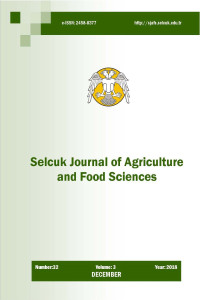Abstract
In this study, the effects of different double row cultivation methods on grain yield and yield parameters in corn production were investigated. Trials; Selçuk University Faculty of Agriculture has been realized in Sarıcalar Research and Production Farm. In the experiment; Four different cultivation methods were applied: conventional (70x16) (U1), double row cross (50x25) (U2), double row (50x25) (U3) and conventional cross double row (50x16) (U4) corn planting. In the study corn variety of DKC5783 FAO 500 group was used. The research, approximately 8,900 seed/da were planted for plant U1, U2 and U3 applications, and 16,400 seed/da were planted norm for U4 application. According to the results of the research; with the highest grain yield of 2233 kg /da in conventional cross double row corn sowing method (U4) and the lowest and rim of 1526 kg /da in conventional single row corn sowing method (U1).
Keywords
Abstract
Bu araştırmada, mısır üretiminde farklı çift sıra ekim yöntemlerinin tane verim ve verim parametreleri üzerine etkisi araştırılmıştır. Denemeler; Selçuk Üniversitesi Ziraat Fakültesi Sarıcalar Araştırma ve Üretim Çiftliğinde gerçekleştirilmiştir. Denemelerde; geleneksel (70x16)(U1), çift sıra çapraz(50x25) (U2), çift sıra (50x25) (U3)ve geleneksel çapraz çift sıra (50x16) (U4) mısır ekimi olmak üzere 4 farklı ekim yöntemi uygulamaya alınmıştır. Araştırmada DKC5783 FAO 500 olum grubuna ait mısır çeşidi kullanılmıştır. Araştırmada bitki sıklığı U1, U2 ve U3 uygulamaları için yaklaşık olarak 8900 tohum/da, U4 uygulaması için 16400 tohum/da ile ekim normu işlemi gerçekleştirilmiştir. Araştırma sonuçlarına göre; en yüksek tane verim 2233 kg/da ile geleneksel çapraz çift sıra mısır ekim yönteminde (U4), en düşük verim ise 1526 kg/da ile geleneksel tek sıra mısır ekim yönteminden (U1) elde edilmiştir.
Keywords
Details
| Primary Language | English |
|---|---|
| Subjects | Agricultural Engineering |
| Journal Section | Research Article |
| Authors | |
| Publication Date | December 28, 2018 |
| Submission Date | July 2, 2018 |
| Published in Issue | Year 2018 Volume: 32 Issue: 3 |
Selcuk Agricultural and Food Sciences is licensed under a Creative Commons Attribution-NonCommercial 4.0 International License (CC BY NC).


